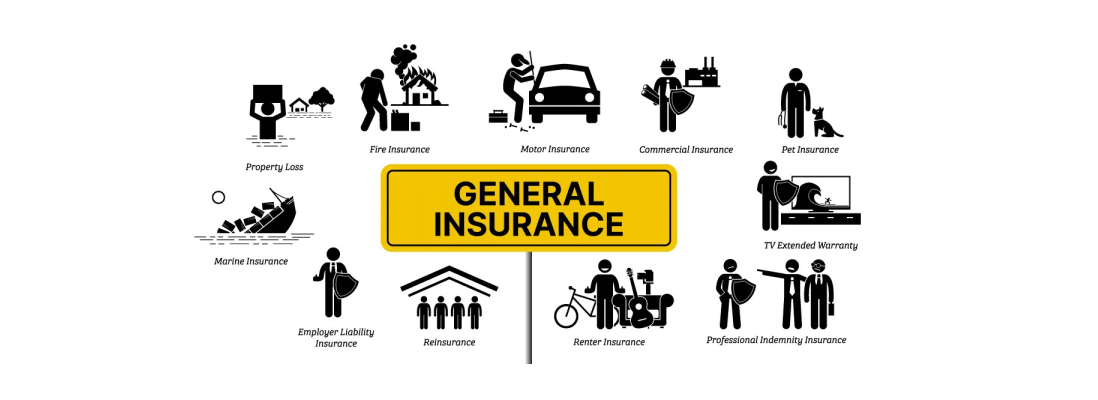General Insurance: Detailed Explanation
General insurance, also known as non-life insurance, refers to a type of insurance policy that provides financial protection against risks other than death, focusing on physical assets or liability. It covers various types of risks that people and businesses face, including the loss or damage of property, accidents, legal liabilities, and health-related issues.
Unlike life insurance, which provides coverage for life and death-related risks, general insurance policies are generally short-term contracts. These policies are renewed annually and typically provide protection for a period of one year, though some can extend for a longer period.
Types of General Insurance
Here are the most common types of general insurance, each offering specific protection against various risks:
Motor Insurance
Motor insurance protects vehicles (cars, motorcycles, and commercial vehicles) from damages due to accidents, theft, natural disasters, or other events. In most countries, having motor insurance is mandatory.
- Third-Party Insurance: Covers damages or injury caused to a third party in an accident involving the insured vehicle. It is the most basic form of motor insurance and is required by law.
- Comprehensive Insurance: Provides coverage for both third-party liabilities and damages to the insured vehicle itself. This includes accidents, fire, theft, vandalism, and natural disasters.
- Own Damage Insurance: Covers damage to the vehicle, excluding third-party liability.
- Commercial Vehicle Insurance: Provides coverage for trucks, buses, and other commercial vehicles used for business purposes.
Home Insurance
Home insurance is designed to protect the structure of your home, along with its contents, from risks such as fire, theft, vandalism, and natural disasters (like earthquakes or floods). It also covers liability for injuries that happen on your property.
- Building Insurance: Covers the structure of the house, including the walls, roofs, doors, and windows.
- Content Insurance: Covers the contents of your home, such as furniture, electronics, clothing, and personal items.
- Comprehensive Home Insurance: A combination of building and content insurance that provides full coverage for both the structure and belongings inside the home.
Travel Insurance
Travel insurance provides coverage for risks associated with traveling, including trip cancellations, medical emergencies, lost luggage, or missed flights. It can be an essential policy for individuals traveling abroad or even domestically, providing protection for both short and long trips.
- Single Trip Insurance: Coverage for a single trip, including medical expenses, trip cancellations, and lost baggage.
- Annual Multi-Trip Insurance: Coverage for multiple trips within a year, ideal for frequent travelers.
- Medical Travel Insurance: Specifically provides coverage for medical emergencies while traveling.
- Baggage Insurance: Covers the loss, theft, or damage to personal belongings while traveling.
Fire Insurance
Fire insurance is designed to protect individuals and businesses from financial loss due to fire damage. It covers the cost of repairing or rebuilding a property damaged or destroyed by fire, as well as damages to inventory, machinery, or goods.
- Coverage for Buildings and Structures: Covers physical structures such as homes, offices, factories, and shops.
- Coverage for Goods: Protects inventory, equipment, and machinery from fire-related damages.
- Loss of Profits: Some policies may cover loss of income if the insured property is a business and operations are halted due to fire damage.
Marine Insurance
Marine insurance covers the loss or damage to ships, cargo, and goods in transit by sea, air, or land. This type of insurance is crucial for shipping businesses, importers, and exporters involved in the movement of goods over large distances.
- Hull Insurance: Covers damage to the ship or vessel itself.
- Cargo Insurance: Covers goods or merchandise being transported.
- Freight Insurance: Protects the cost of freight in case goods are damaged during transit.
Liability Insurance
Liability insurance provides coverage for legal expenses and financial protection if you are found legally responsible for causing injury or damage to others. It is essential for businesses and individuals who may be exposed to such risks.
- Public Liability Insurance: Protects businesses or individuals against claims made by the public for bodily injury or property damage caused by the insured party.
- Employer's Liability Insurance: Required for employers to cover work-related injuries or illnesses suffered by employees.
- Product Liability Insurance: Covers manufacturers and sellers from claims arising out of defective products that cause harm to consumers.
- Professional Indemnity Insurance: Protects professionals (such as doctors, lawyers, and consultants) from claims related to errors or negligence in their professional services.
Accident Insurance
Accident insurance provides financial support in the event of an accident resulting in injury, disability, or death. It covers medical expenses, loss of income, and in some cases, funeral expenses.
- Personal Accident Insurance: Covers the insured for accidental death or permanent disability caused by an accident.
- Group Accident Insurance: Offered to employees by an employer as part of a benefits package, covering employees in case of an accident.
- Accidental Health Insurance: Covers medical expenses arising from accidents, such as hospital stays, surgeries, and treatment.
Crop Insurance
Crop insurance is designed for farmers and provides coverage against crop loss or damage due to natural calamities like droughts, floods, hailstorms, pests, or diseases. It helps farmers recover financially from crop failures and ensures food security.
- Yield-based Insurance: Covers a fixed yield per hectare, and the farmer receives compensation if the yield falls below this threshold.
- Revenue-based Insurance: Provides compensation based on the revenue loss due to damage or crop failure.
- Comprehensive Crop Insurance: Covers all types of risks, including natural disasters, pests, diseases, and other factors affecting crop production.
Benefits of General Insurance
- Financial Protection: Protects individuals and businesses from financial loss by covering repair costs, medical bills, legal liabilities, and more.
- Peace of Mind: Reduces the stress of worrying about potential risks and unexpected events, knowing you're covered.
- Legal Requirements: Some types of general insurance (such as motor and workers' compensation) are required by law in many jurisdictions.
- Risk Management: Helps individuals and businesses manage risks associated with various activities, reducing the financial impact of unforeseen events.
